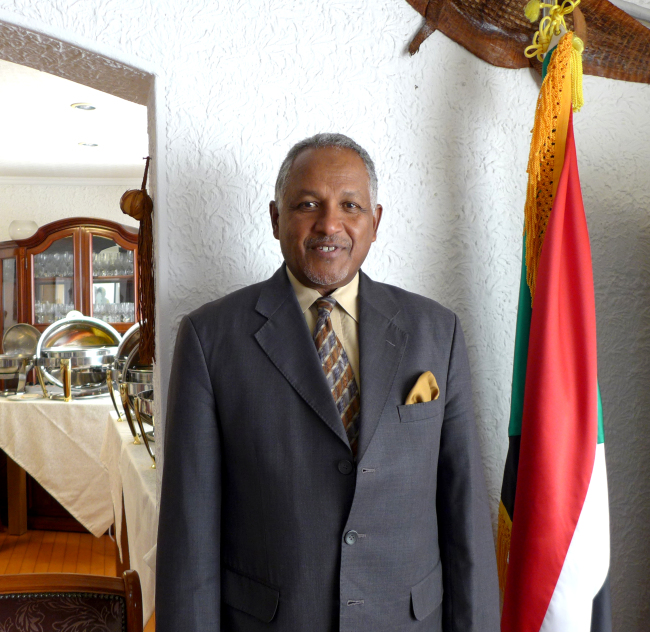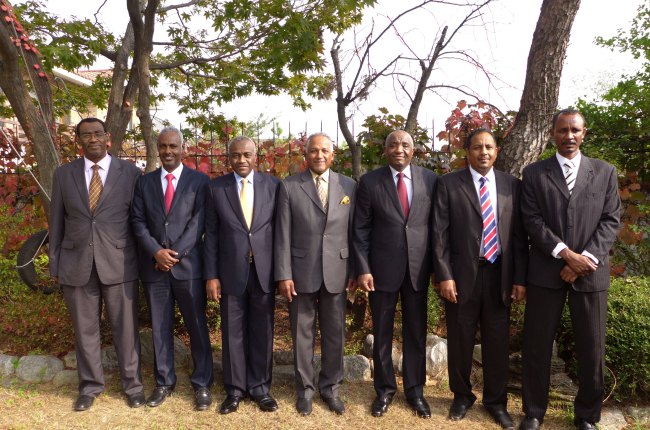A delegation of Sudanese diplomats visited Korea last week to participate in the fifth round of policy consultations with Korean counterparts, where they discussed political relations, trade and investment, development cooperation and international collaboration.
Daffalla El Haj Ali, the director general of the Sudanese Ministry of Foreign Affairs’ bilateral and regional department, reached an agreement with Korea on exchanging ministerial and high-level visits, enhancing mutual support at international forums, ratifying investment protection, preventing double taxation, hosting an economic forum and renewing aid facilities in Sudan.
“Despite our geographic distance, Korea is dear in the hearts of all Sudanese,” Ali told The Korea Herald in an interview. “The 5th consultation was an opportunity to update one another on development and look toward new horizons for future cooperation.”
Daffalla El Haj Ali, the director general of the Sudanese Ministry of Foreign Affairs’ bilateral and regional department, reached an agreement with Korea on exchanging ministerial and high-level visits, enhancing mutual support at international forums, ratifying investment protection, preventing double taxation, hosting an economic forum and renewing aid facilities in Sudan.
“Despite our geographic distance, Korea is dear in the hearts of all Sudanese,” Ali told The Korea Herald in an interview. “The 5th consultation was an opportunity to update one another on development and look toward new horizons for future cooperation.”

A career diplomat since 1980, Ali served as a counsellor in Seoul from 1990-92, and opened the embassy before the first ambassador’s arrival. During that time, U.N. Secretary-General Ban Ki-moon was the director general of the two Americas at MOFA, and the two diplomats met again in 2010 when Ali was a permanent representative to the U.N., he said.
The forum was Seoul’s 14th meeting with an African nation as part of efforts to reach out to the resource-rich continent. This year alone, consultations were held with Equatorial Guinea, the Democratic Republic of Congo, Angola, Namibia, Zambia, Botswana, Mozambique, Tanzania, Ivory Coast, Seychelles, Zimbabwe, the Republic of Congo and Ghana.
Khartoum and Seoul established diplomatic relations in 1977, elevating the consular relations initiated a year before.
The director general emphasized that Sudan valued Korea’s development experience with much regard. “We want a win-win partnership by combining Korea’s capital and technology and Sudan’s untapped resources in agriculture, minerals and livestock.”
For foreign investors, three economic zones ― the Sudanese Free Zones, the Red Sea Free Zones and Al Gaili Free Zones ― operate near Port Sudan along the Red Sea.
“Sudan is the gateway to Africa and bridgehead to the Middle East,” he stressed, adding that foreign capital could eye domestic, regional and continental markets.

To date, Seoul has provided $3.2 million in official development assistance to Khartoum with the help of the Korea International Cooperation Agency, which has supported a range of capacity-building projects in agriculture, information technology, education, vocational training and community building.
A Korean medical center is being built in Wad Madani, capital of Al Gezira state in east-central Sudan, for the purpose of epidemic prevention and disease treatment.
Ali pointed to the ongoing construction of the Grand Ethiopian Renaissance Dam, which came out of intense negotiations between Ethiopia, Egypt and Sudan.
“The project initially raised concerns from Egypt with regard to control over regional power,” he said, “but as a geostrategic player in the Horn of Africa, we played the role of an honest broker.”
The water will be shared and the entire scheme will contribute to regional sustainable development, further establishing peace, stability and prosperity, according to the diplomat.
Regarding the country’s relations with its southern neighbor South Sudan, which gained independence on July 9, 2011, after six decades of civil war, he said his government was working with the Intergovernmental Authority for Development to resolve issues left by the comprehensive peace agreement, principally demarcating borders and eliminating rebel groups.
Joel Lee (joel@heraldcorp.com)
-
Articles by Korea Herald




![[Weekender] Korean psyche untangled: Musok](http://res.heraldm.com/phpwas/restmb_idxmake.php?idx=644&simg=/content/image/2024/05/02/20240502050841_0.jpg&u=)

![[Eye Interview] 'If you live to 100, you might as well be happy,' says 88-year-old bestselling essayist](http://res.heraldm.com/phpwas/restmb_idxmake.php?idx=644&simg=/content/image/2024/05/03/20240503050674_0.jpg&u=)











![[Herald Interview] Director of 'Goodbye Earth' aimed to ask how we would face apocalypse](http://res.heraldm.com/phpwas/restmb_idxmake.php?idx=652&simg=/content/image/2024/05/03/20240503050732_0.jpg&u=)
